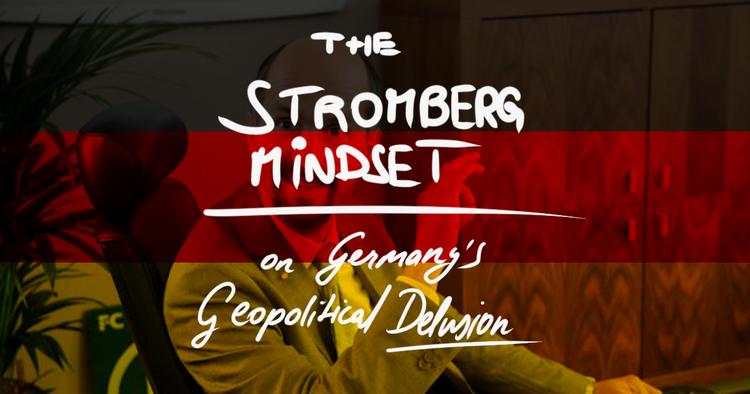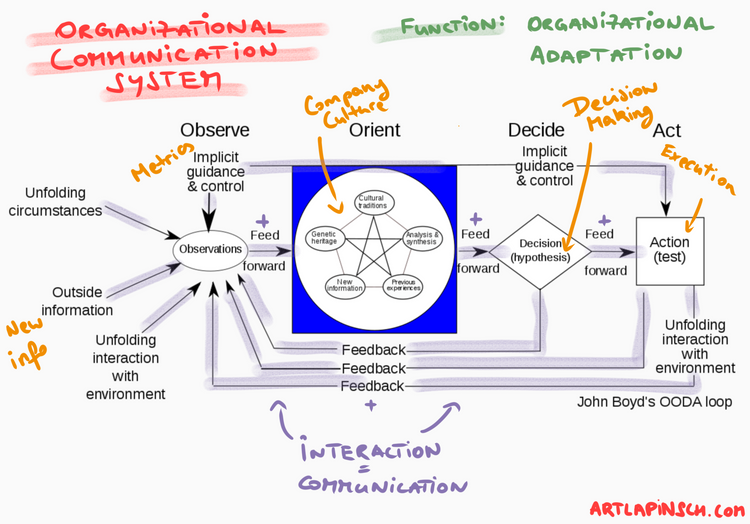Systems Thinking in Times of Crisis: Three Frameworks for Policymaking 🔥
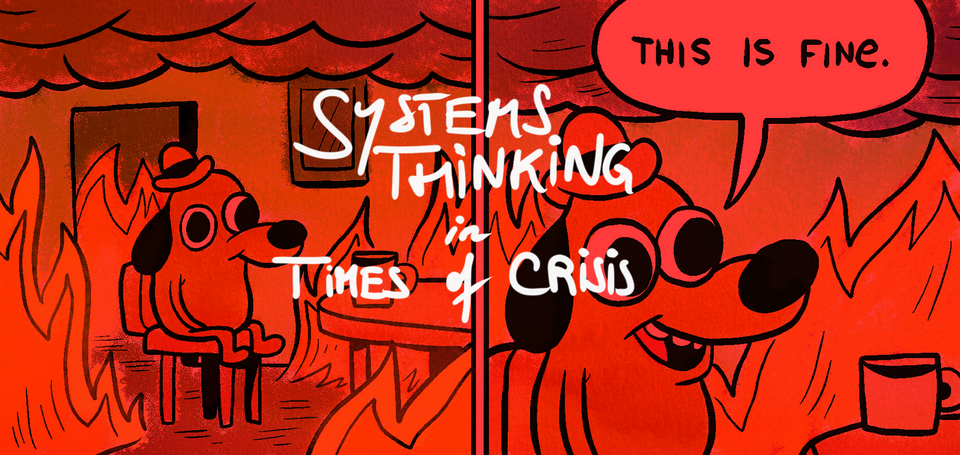
Before we talk about Systems Thinking, I’d like to introduce you to a simple idea: The Map Is Not the Territory
The core insight is that maps are representations of reality but not reality itself. They are helpful, but they have their limitations (outdated; wrong measurements; you are holding the map upside down; etc.).
“All models are wrong, but some are useful.” - George P.E. Box
Why am I telling you this? Because in social sciences we are dealing with representations of reality. Never forget this.
Maps are helpful but it helps to look up from time to time.
Today I want to introduce three ideas from Systems Thinking in the context of crisis management. The goal is to start seeing connections and make sense of the complexity around you.
I organize it on three levels of observation:
- Strategic (long-term): Path Dependence 🛤
- Operational (medium-term): Eco-Structure ♻️
- Tactical (short-term): Information Loops 🔁
Path Dependence: Uncovering the Tracks of History 🛤
TL;DR: To understand the present, look at the past.
“Why the f*ck would they do this?”
I’ve asked myself this question many times over the past weeks. Two things have stood out:
- Why did Russia invade Ukraine on February 24th?
- Why is Germany unwilling to keep its existing nuclear power plants running despite an unprecedented energy shortage?
The answer to both is that history matters.
#1: Why Did Russia Invade Ukraine?
Since I'm not an expert, I’ll share the two most helpful (re)sources I have found so far:
- Russia Analysis (Martti J. Kari, Finnish Intelligence Colonel) [1-hour long lecture with subtitles 🎥] - Colonel Kari discusses Russia’s “Strategic Culture”. It is a deep dive into Russian history since the Byzantine Empire to understand Russia’s political decision-making today. It helps to step out of your own bubble and take a look at the other side of the narrative.
- In-Depth Analyses About Russia (Kamil Galeev, Galina Starovoitova Fellow at The Wilson Center, DC) [Collection of Twitter threads 🧵] - Kamil writes long-form analyses about all aspects of Russia (history; logistics; demographics; political and spiritual orientation; the role of oligarchs/military/state police/Orthodox Church/etc.).
#2: Why Is Germany Dragging Their Feet on Nuclear Energy?
In Germany, 2022 feels like a perfect storm hailing from the past.
The EU is facing a supply shortage of 10-15% - regardless if there's an oil/gas import embargo from the EU or if Russia decides to stop exporting.
Even record high non-Russian imports would not be enough to sufficiently refill storage ahead of next winter. Europe would need to reduce demand by at minimum 400 TWh (or 10%-15% of annual demand). This is possible. A portfolio of exceptional options could abate at least 800 TWh. (source: https://bit.ly/36y6qml)
Meanwhile, Germany is phasing out three nuclear power plants by December 2022. Their combined energy output is ~15 TWh.
Why does this seem like a foolish idea? Because Germany imports 50%+ of its liquid natural gas from Russia and at the same time has a large dependence on gas in its energy mix.
There is a multitude of reasons why Germany's policymakers can't act quickly and course correct - legal; economic; etc.
But I'd like to highlight a cultural reason: Atomkraft? Nein Danke!
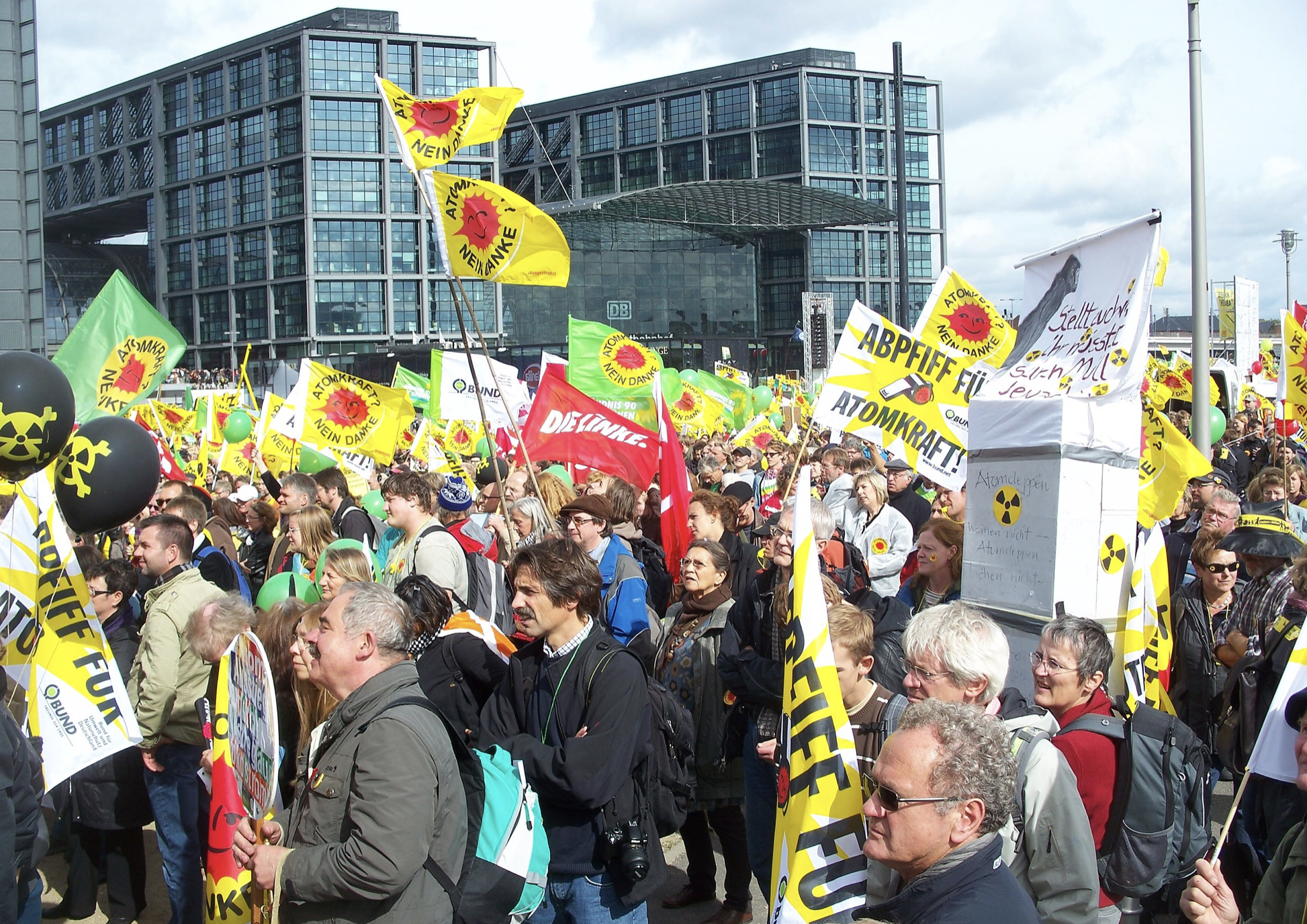

We become the stories we tell ourselves | Source: https://bit.ly/3DgBxi4
Activism against nuclear power has been en vogue since the 1970s. In 2021, 82% of surveyed Germans were against nuclear power. Try making the right policy moves in this context.
The past informs the present.
Ecostructure: Looking Beyond the Obvious Players ♻️
TL;DR: Systems have various leverage points.
Question: Does change happen when policymakers do their job?
Answer: Yes. And...
The 'and...' part is particularly interesting.
Abel Wolman - a pioneer in public health - understood that change happens when three groups of people come together:
- Technocrats: Domain-area experts tasked to analyze situations and give recommendations
- Policymakers: People in positions of power
- Civic Leaders: People with influence and political leverage
These three groups form an ecostructure.
I currently see two types of policies being applied in the context of the Ukraine War.
#1: Sanctions Against Russia (Top-Down)
Economic sanctions are changing the context for Russian citizens.
This is a top-down activity by many governments to put pressure on the Russian economy and as one of the results put pressure on civic leaders in Russia (oligarchs; citizens).
An anticipated second-order effect is pressure put onto policymakers by civic leaders.
#2: Open-Source Intelligence (Bottom-Up)
OSINT activities are documenting war crimes in public.
This bottom-up activity is driven by civic leaders - the OSINT community - and puts pressure on policymakers to act.

Civic leaders get frequently overlooked when thinking about policy. Don't miss them.
Takeaway: Systems have different leverage points.
Information Loops: Executing at the Quality of Your Information 🔁
TL;DR: Don't fool yourself.
Information systems are reinforcing loops that can be summarized as follows: Rubbish in. Rubbish out.
An information system can have different shapes and sizes:
- Small: A nervous system 🧠
- Medium: A company 🏢
- Large: A government 🏰
I'm not an expert in policymaking but I studied communication far more than my six-year-old self would have ever dreamed of.
One of my favorite frameworks to illustrate organizational information loops is the OODA Loop.
I'll explain the four stages of the loop with examples of all sizes (small | medium | large):
- Observe: Observation | Metrics | Intel
- Orient: Experience | Corporate Culture | Strategic Culture
- Decide: Decision | Management | Directive
- Act: Hands | Departments | Executive Branch
Communication is how information moves from one step of the OODA loop to the next.
Things Go Wrong When your Information Loop Stops Working
Try catching a ball if you have myopia in both eyes, don't wear corrective glasses, haven't worked out in years, and don't want to get dirty.
Try invading a country if your information is outdated, your assessment is biased, your decision-making is erratic, and your military is clueless.
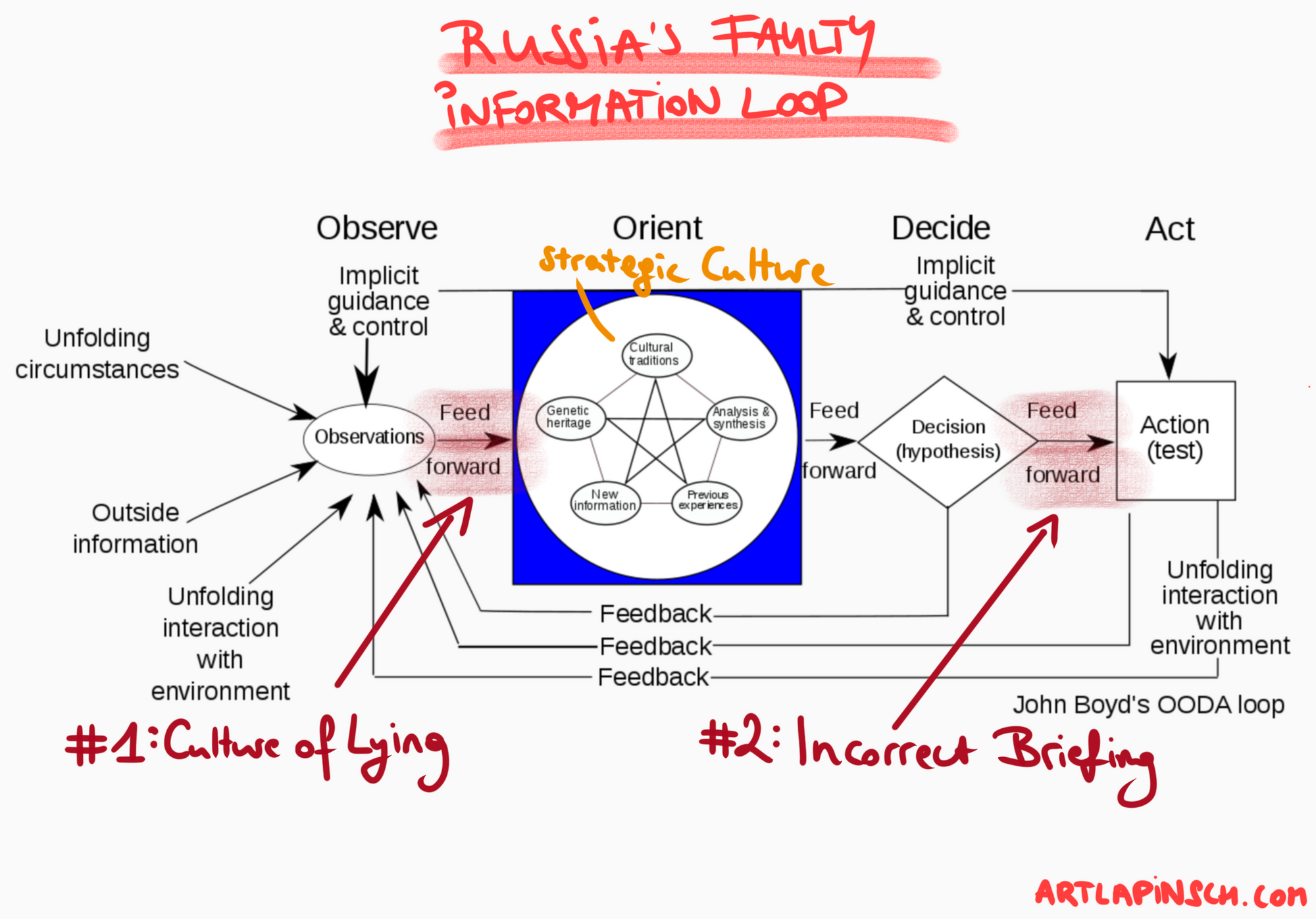
The two biggest flaws I can tell from the information on Russia's leadership are the following:
- Culture of Lying: Truth is punished - as seen in the public reprimanding of Sergei Naryshkin. This breeds a culture of telling expected truths rather than factual truths.
- Incorrect Briefing: Centralization of complete information is harmful when your leadership and especially the executive branch doesn't get the full picture. Russian soldiers were reportedly told that "they would go on an exercise" and instead they were sent to war.
4. Chris Krebs points out in the Washington Post that Russia's cyber forces do not seem to have been included & thus did nothing (FSB, SVR & GRU).
— Anders Åslund (@anders_aslund) March 23, 2022
5. Nothing on the Russian side seems to have been coordinated because of overcentralization = Putin.
Takeaway: Since information loops are reinforcing (positive as well as negative) is critical to check yourself before you wreck yourself.
The first principle is that you must not fool yourself and you are the easiest person to fool. - Richard Feynman
Bottomline: The World Is Complex
In this article, I have shared a couple of tools that help me to deal with the complexity of the Ukraine War.
- The map is not the territory 🗺
- To understand the present, look at the past 🛤
- Systems have various leverage points ♻️
- Don't fool yourself 🔁


